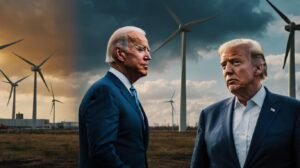
Introduction
As the United States prepares for the 2024 Presidential Election, the stakes have never been higher. This election has the potential to shape not only the future of American politics but also the global landscape. Critical issues such as economic recovery, healthcare access, climate change, and social justice are at the forefront, driving unprecedented levels of voter engagement. Understanding the candidates, their platforms, and the implications of their policies is vital for informed decision-making.
This article explores the historical context of U.S. presidential elections, introduces key candidates, analyzes major campaign themes, and evaluates the potential global impact of the election results.

Historical Context
To fully grasp the significance of the upcoming election, it is essential to reflect on the historical context of U.S. presidential elections. The outcomes of these elections have shaped the trajectory of the nation and its role in the world.
The Evolution of Presidential Elections
The U.S. electoral system has evolved significantly since the first presidential election in 1789. From the establishment of the Electoral College to the expansion of voting rights, each election has reflected the changing dynamics of American society.
In the early years, elections were characterized by intense partisanship and limited voter access. The introduction of the secret ballot and the expansion of suffrage in the 20th century marked significant milestones in democratizing the electoral process.
Today, the political landscape is defined by a highly polarized electorate, driven by issues such as race, class, and ideology. This polarization influences not only the candidates who run but also the strategies they employ to connect with voters.
Key Historical Elections
To better understand the current electoral climate, we must reflect on key historical elections that have had a lasting impact on American society.
– **The 1932 Election**: Franklin D. Roosevelt’s victory during the Great Depression underscored the importance of effective governance in times of crisis. Roosevelt’s New Deal policies reshaped the relationship between the government and citizens, emphasizing the federal government’s role in economic recovery.
– **The 1960 Election**: The election of John F. Kennedy was notable for its focus on civil rights and international relations during the Cold War. Kennedy’s charisma and the influence of television marked a new era of political campaigning, showcasing the power of media in shaping public perception.
– **The 2008 Election**: Barack Obama’s election represented a seismic shift in American politics, symbolizing hope and change. His presidency focused on healthcare reform and international diplomacy, contrasting sharply with the preceding administration’s approach.
Each of these elections had profound implications not only for the United States but also for global politics. As we approach the 2024 election, the lessons learned from these pivotal moments will be essential for understanding the current political landscape.

Key Candidates
The 2024 U.S. presidential election features a diverse array of candidates, each with unique visions for America’s future. Understanding these candidates, their platforms, and their potential impact is crucial for voters.
Democratic Party: Joe Biden
**Joe Biden**, the incumbent president, is expected to seek re-election in 2024. His presidency has faced numerous challenges, including managing the COVID-19 pandemic, addressing economic disparities, and navigating international relations.
Biden’s Achievements and Challenges
Biden’s presidency has focused on several key areas:
– **Economic Recovery**: The American Rescue Plan aimed to provide immediate relief to families and businesses affected by the pandemic. The plan allocated $1.9 trillion to help Americans cope with the economic fallout, including direct payments, extended unemployment benefits, and support for small businesses. Biden’s administration also prioritized infrastructure spending through the Bipartisan Infrastructure Law, which allocates billions for repairing roads, bridges, and public transit.
– **Healthcare Access**: Biden has sought to expand access to affordable healthcare by strengthening the Affordable Care Act and advocating for lower prescription drug prices. His administration has also worked to increase funding for mental health services, recognizing the growing need in the wake of the pandemic.
– **Climate Change**: The Biden administration rejoined the Paris Agreement and proposed ambitious climate goals, including a transition to renewable energy sources. Initiatives like the Clean Energy Standard aim to cut greenhouse gas emissions significantly by 2030, focusing on achieving a carbon-free power sector by 2035.
Despite these achievements, Biden faces challenges, including low approval ratings and criticism from progressives who feel that he has not gone far enough on issues like climate action and social justice.
Key Issues in Biden’s Campaign
As the election approaches, Biden’s campaign will likely center on:
– **Building on Economic Progress**: Highlighting job growth and economic stability while addressing inflation concerns that have affected many households. Biden’s team will likely focus on the narrative of economic recovery and continued growth, emphasizing the importance of stability in a post-pandemic world.
– **Expanding Healthcare**: Advocating for continued healthcare reforms and ensuring that the gains made during his term are protected, particularly in the context of ongoing public health challenges. Biden may propose further expansions of healthcare coverage and initiatives aimed at reducing out-of-pocket costs for Americans.
– **Climate Initiatives**: Promoting policies aimed at reducing carbon emissions and investing in green technologies. Biden’s campaign will likely emphasize the urgency of addressing climate change, presenting it as not only an environmental issue but also an economic opportunity.
– **Social Justice**: Addressing systemic inequalities and advocating for policies that promote equity and inclusion, particularly in areas such as policing, housing, and education. Biden may highlight his administration’s efforts to address racial disparities and promote civil rights, appealing to progressive voters.
Biden’s ability to rally his base while appealing to moderate voters will be critical for his re-election campaign.

Republican Party: Donald Trump
**Donald Trump**, the former president, remains a powerful figure within the Republican Party and is widely expected to run for re-election. His presidency was characterized by a populist agenda that resonated with many voters.
Trump’s Policies and Impact
Trump’s administration focused on several key areas:
– **Economic Nationalism**: Advocating for protectionist trade policies that prioritize American workers and industries. His administration imposed tariffs on various imports, particularly from China, to protect domestic manufacturing and sought to renegotiate international trade agreements to favor U.S. interests.
– **Immigration Policy**: Continuing to push for stricter immigration controls, including the construction of a border wall and policies aimed at reducing illegal immigration. His administration focused on enforcement measures and sought to limit asylum claims, framing immigration as a threat to national security.
– **Foreign Policy**: Emphasizing an “America First” approach that prioritized national interests over international agreements. This included withdrawing from the Paris Climate Accord, renegotiating trade deals, and taking a hardline stance on countries like Iran and China.
Trump’s presidency was marked by significant polarization, and his return to the campaign trail raises questions about the future of the Republican Party and the electorate’s appetite for his brand of politics.
Key Issues in Trump’s Campaign
Trump’s potential campaign may focus on:
– **Restoring Economic Growth**: Promising to bring back jobs and boost the economy through tax cuts and deregulation, arguing that his policies before the pandemic led to historic economic growth. Trump may emphasize his record on job creation and economic expansion as a key selling point.
– **Strengthening Immigration Policies**: Continuing to advocate for measures that prioritize border security and limit immigration, framing the issue as central to national security. Trump is likely to continue using immigration as a rallying point for his base, emphasizing the need for stricter enforcement.
– **Upholding Law and Order**: Positioning himself as the candidate of safety and security in response to rising crime rates and civil unrest. Trump may appeal to voters concerned about crime and public safety, arguing that he is better suited to restore order.
– **Challenging the Status Quo**: Presenting himself as an outsider willing to take on entrenched interests in Washington, he appealed to voters frustrated with traditional politics. Trump’s narrative of being a political outsider continues to resonate with many voters who feel disillusioned with the establishment.
Trump’s ability to galvanize support among his base while reaching out to undecided voters will be crucial for his campaign.

Third-Party Candidates
While the two-party system dominates U.S. politics, third-party candidates can influence the election by providing alternative perspectives and drawing votes away from major party candidates. In 2024, several notable third-party candidates could emerge:
– **Cornel West (Green Party)**: A prominent academic, activist, and author, West’s campaign may focus on social justice, environmental issues, and economic inequality. His platform could resonate with progressive voters seeking a more radical approach to reform. West is likely to advocate for policies such as universal healthcare, tuition-free public college, and a Green New Deal.
– **Jill Stein (Green Party)**: A former presidential candidate, Stein may advocate for comprehensive healthcare reform and aggressive climate action, appealing to voters concerned about environmental sustainability. Stein has consistently focused on issues like corporate influence in politics, advocating for campaign finance reform and grassroots democracy.
– **Robert F. Kennedy Jr. (Independent)**: Known for his activism, Kennedy could attract voters disillusioned with the two-party system, particularly on issues related to health freedom and environmental concerns. Kennedy’s platform may focus on vaccine safety, environmental protection, and civil liberties.
The presence of third-party candidates can significantly impact the election by introducing new ideas into the political conversation and potentially altering the dynamics of vote distribution.

Campaign Themes and Issues
As the election unfolds, several key themes and issues are likely to dominate the campaign discourse. Candidates must articulate their positions clearly and resonate with voters on various fronts.
Economic Recovery
Economic recovery remains a top priority for voters. The lingering effects of the COVID-19 pandemic continue to influence public sentiment. Candidates will need to address:
– **Job Creation**: Strategies for job growth and support for small businesses will be critical. Voters want to see concrete plans for economic revitalization, particularly in sectors hardest hit by the pandemic, such as hospitality and travel.
– **Inflation and Cost of Living**: With rising prices impacting everyday life, candidates must propose solutions to ease financial burdens on families. This includes addressing costs related to housing, groceries, and fuel, which have become increasingly pressing issues for many Americans.
– **Income Inequality**: Addressing disparities in wealth and income will resonate with voters concerned about fairness in the economic system. Candidates may propose progressive tax policies or wage increases to address these issues, emphasizing the importance of creating a more equitable economy.
Healthcare Access
Healthcare remains a critical concern for many Americans. Candidates will debate:
– **Affordability**: Proposals for lowering healthcare costs and prescription drug prices are likely to be central to the discussion. Candidates will need to present viable plans to make healthcare accessible to all, ensuring that no one is left behind due to financial constraints.
– **Access to Care**: Ensuring that all Americans have access to quality healthcare will be a priority for candidates, especially in light of the pandemic’s impact on healthcare systems. Addressing disparities in healthcare access for rural and underserved communities will be crucial.
– **Mental Health Services**: Increasing awareness and access to mental health resources will be essential in addressing the ongoing mental health crisis exacerbated by the pandemic. Candidates may advocate for increased funding for mental health services and the integration of mental health care into primary healthcare systems.
Candidates’ positions on healthcare will be closely scrutinized, as voters seek assurance that their needs will be met.
Climate Change
Climate change has emerged as one of the defining issues of our time. Candidates will need to outline their plans for addressing environmental challenges:
– **Renewable Energy Initiatives**: Candidates must articulate strategies for transitioning to clean energy sources and reducing reliance on fossil fuels. This may include expanding solar and wind energy projects, as well as investing in energy efficiency programs.
– **International Cooperation**: The U.S. role in global climate agreements will be a significant topic, with candidates either reaffirming commitments or proposing a more isolationist approach that could undermine international efforts to combat climate change.
– **Disaster Preparedness**: Addressing the increasing frequency of natural disasters and climate-related events will resonate with voters concerned about their safety and security. Candidates may need to propose comprehensive disaster response plans and community resilience initiatives.
Candidates’ commitment to robust climate action will be pivotal in attracting environmentally conscious voters.
Social Justice and Equity
The fight for social justice and equity continues to be a driving force in American politics. Candidates will be expected to address:
– **Systemic Inequalities**: Proposals for addressing racial, gender, and economic disparities will be crucial in gaining support from marginalized communities. Candidates will need to present actionable plans to dismantle systemic barriers that perpetuate inequality.
– **Voting Rights**: Candidates must advocate for policies that protect voting rights and ensure fair access to the electoral process. This includes opposing voter ID laws and supporting measures to expand early voting and mail-in ballots.
– **Criminal Justice Reform**: The need for comprehensive reforms in the criminal justice system will resonate with voters seeking justice and accountability. Candidates will need to address issues such as police reform, sentencing disparities, and the decriminalization of certain offenses.
Engaging with diverse communities and advocating for policies that promote inclusivity will be essential for candidates seeking to connect with younger and progressive voters.

Global Impact of the Election
The implications of the 2024 election extend far beyond U.S. borders, affecting international relations, global economics, and environmental policies. Depending on the candidates’ positions and policies, the outcome could lead to significant changes in how the U.S. interacts with the rest of the world.
International Relations
The United States has long been a global leader, and the direction of its foreign policy will be shaped by the next president.
– **Biden’s Multilateralism**: A Biden re-election could reinforce a return to multilateralism, emphasizing diplomacy and cooperation with allies. This may include re-engaging in international agreements such as the Iran nuclear deal, strengthening relationships with NATO allies, and prioritizing global health initiatives.
– **Trump’s Isolationism**: A Trump presidency may lead to a more isolationist approach, prioritizing national interests over global collaboration. This could strain alliances and affect international stability, particularly in regions where U.S. involvement has historically played a crucial role, such as the Middle East and Asia.
The global community is watching closely, as the direction of U.S. foreign policy will have far-reaching implications for international stability and cooperation.
Economic Implications
The 2024 election will have significant implications for global markets and trade relationships.
– **Biden’s Trade Policies**: The Biden administration has sought to strengthen economic partnerships and support multilateral trade agreements. A continued focus on international cooperation may foster economic stability and growth, benefiting not only the U.S. but also its trading partners.
– **Trump’s Protectionism**: A Trump-led administration may revert to protectionist policies, potentially leading to trade wars and disruptions in global supply chains. The uncertainty surrounding U.S. trade policies could impact businesses and economies worldwide.
The outcome of the election will influence not only American businesses but also the global economy, with potential ripple effects felt across various sectors.
Climate Policy
Climate change is a global crisis that requires collective action. The outcome of the 2024 election will determine the U.S. commitment to environmental initiatives and its role in international climate agreements.
– **Biden’s Climate Goals**: A Biden victory may lead to renewed efforts to combat climate change, with a focus on transitioning to clean energy and reducing greenhouse gas emissions. His administration’s approach to climate policy may encourage other nations to adopt similar measures, fostering a united front against climate change.
– **Trump’s Environmental Rollback**: A Trump presidency could see a rollback of environmental regulations and a prioritization of fossil fuel industries. This shift may have dire consequences for the global fight against climate change, potentially undermining international efforts to mitigate its effects.
The stakes are high, and the world is watching as the United States navigates its role in addressing one of the most pressing challenges of our time.

Voter Engagement and Turnout
Voter engagement is critical to the success of any campaign. Candidates will need to employ various strategies to mobilize support and encourage turnout, particularly among younger voters and marginalized communities.
Grassroots Mobilization
Grassroots movements have proven effective in energizing voters and driving turnout. Candidates may focus on building strong local networks, engaging volunteers, and organizing events to connect with constituents. Mobilizing grassroots support can create a sense of community and purpose among voters.
Social Media Campaigns
In the digital age, social media plays a crucial role in shaping public perception and engaging voters. Candidates will leverage platforms like Twitter, Facebook, and Instagram to communicate their messages, share updates, and interact with supporters. Creative and targeted social media campaigns can reach a wide audience, particularly younger voters who are more likely to engage online.
Town Hall Meetings and Community Events
Direct engagement with voters through town hall meetings, forums, and community events can help candidates connect on a personal level. These events provide a platform for voters to voice their concerns and ask questions, fostering a sense of accountability among candidates.
Targeted Outreach
Candidates will need to develop targeted outreach strategies to engage specific demographics, including young voters, women, and communities of color. Tailoring messaging and addressing the unique concerns of these groups can help candidates build a broad and diverse coalition of support.
Conclusion
The 2024 US Presidential Election is shaping up to be a pivotal moment in American history, with the potential to redefine the nation’s domestic policies and global standing. As candidates emerge and campaign themes take shape, voters must remain informed and engaged in the political process. The stakes are high, and the outcome of this election will reverberate across the globe.
With critical issues on the table, such as economic recovery, healthcare access, climate change, and social justice, candidates must articulate clear and compelling visions for the future. The choices made by the electorate will not only impact the United States but will also influence international relations, global markets, and environmental policies.
As we approach this critical election, **zaroraterishta.com** will provide essential insights, updates, and analyses to help voters navigate the complexities of the political landscape. Staying informed and actively participating in the democratic process is vital for shaping a future that reflects the values and aspirations of all Americans.
Detailed FAQs – US Presidential Election 2024
1. Who are the main candidates in the 2024 U.S. Presidential Election?
The primary candidates are incumbent President Joe Biden for the Democratic Party and former President Donald Trump for the Republican Party. Notable third-party candidates include Cornel West, Jill Stein, and Robert F. Kennedy Jr.
2. What are the key issues shaping the 2024 election?
Major issues include economic recovery, healthcare access, climate change, immigration, social justice, and foreign policy. These topics are influencing both policy debates and voter turnout.
3. How does the outcome of the election impact global politics?
The next U.S. president will influence international relations, trade policies, and climate agreements. Biden promotes multilateralism, while Trump supports isolationist and protectionist policies.
4. What’s the role of third-party candidates in the 2024 election?
Though unlikely to win, third-party candidates like Cornel West and Jill Stein can shift national discourse, highlight ignored issues, and potentially split votes, affecting final results.
5. How does the U.S. electoral system work for presidential elections?
Voters elect members of the Electoral College, who then cast votes for the president. A candidate needs 270 out of 538 electoral votes to win.
6. What are the foreign policy differences between Biden and Trump?
Biden supports international cooperation, such as NATO and the climate accords. Trump emphasizes “America First,” focusing on bilateral deals and military strength.
7. How will this election affect climate change policies globally?
A Biden win may boost global climate action and clean energy investment. A Trump win could result in deregulation and renewed focus on fossil fuels, potentially stalling international climate goals.
8. Why is voter turnout critical in the 2024 election?
High turnout, especially among young, minority, and first-time voters, could sway results in battleground states. Both parties are ramping up grassroots and digital outreach efforts.
9. What are the economic priorities of each major candidate?
Biden focuses on infrastructure, clean energy, and wage equity. Trump promotes tax cuts, deregulation, and trade protectionism to stimulate economic growth.
10. How will healthcare be addressed by candidates in 2024?
Biden plans to expand the Affordable Care Act and reduce drug prices. Trump may push for market-driven reforms, healthcare deregulation, and repeal of ACA elements.
